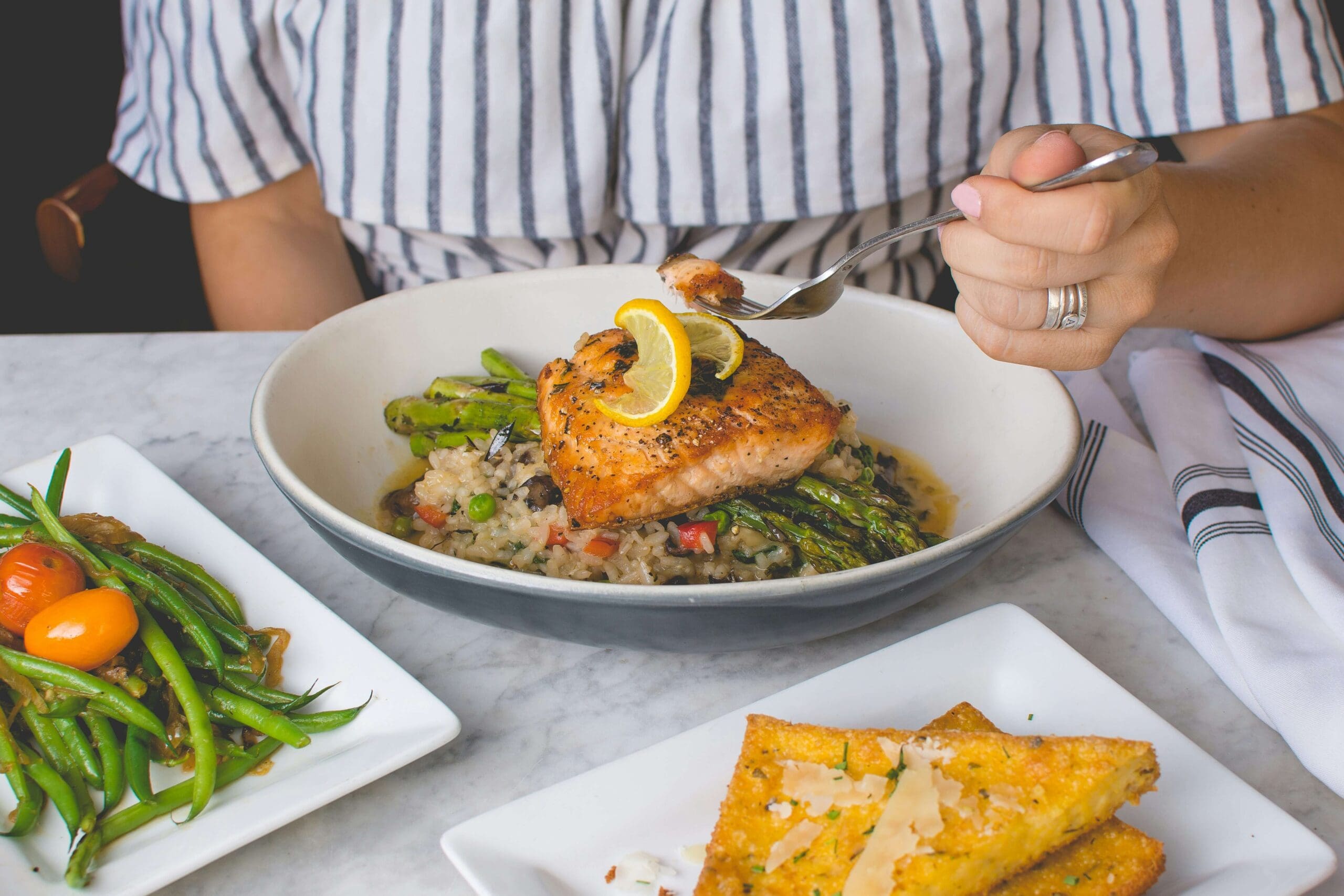Cancer treatment brings challenges that can feel overwhelming. Your body goes through so much as treatments like chemotherapy, radiation, and immunotherapy work to fight cancer cells.
Along the way, these powerful treatments can affect healthy cells too, leading to side effects that impact your daily life. But here’s what matters most: as your dietitian, I want you to know you have more control than you think.
With the right support and practical strategies, you can manage these side effects and feel stronger throughout your journey. You’re not alone in this, and there are real ways to feel better each day.
Get Your Free Clean Scan Plan
Join thousands who have transformed their cancer prevention journey with the Clean Scan Plan. This free guide provides everything you need to understand your body, make empowered food choices, and approach a cancer prevention lifestyle with clarity around how to eat well, instead of confusion.
Understanding Cancer Treatment Side Effects
Side effects happen when cancer treatments damage healthy cells while targeting cancer cells. Every person experiences treatment differently. Your age, overall health, cancer type, and specific treatments all play a role in which side effects you experience and how intense they feel.
As your oncology dietitian, I’ve worked with thousands of survivors navigating these challenges. Most side effects are temporary and manageable with the right nutrition approach. Some appear during treatment and can fade quickly especially with the right nutrition plan, which is what I give you inside VIP 1:1 Coaching.
If you’re ready for expert, personalized support, apply here for: VIP 1:1 Cancer nutrition & Lifestyle Coaching with me today so you don’t waste another week stuck guessing what’s right for your body.
Hair Loss During Treatment
Hair loss ranks as one of the most emotionally challenging side effects. Chemotherapy causes hair loss because it targets rapidly dividing cells, which includes hair follicles.
You might lose hair on your scalp, eyebrows, eyelashes, and body. Hair typically starts falling out within two to three weeks after chemotherapy begins.
One of my clients shared how devastating it felt when her daughter asked why mommy looked different. We worked together on building confidence beyond appearance, focusing on inner strength and health. Today, her hair has grown back beautifully, but more importantly, she discovered resilience she didn’t know she had.
Not all chemotherapy drugs cause complete hair loss. Some cause thinning, while others don’t affect hair at all. Hair usually regrows within three to six months after treatment ends, though it may have a different texture or color initially.
Practical tips for managing hair loss:
- Cut hair short before treatment starts to make the transition easier
- Use gentle, fragrance free shampoos on sensitive scalps
- Protect your scalp from sun exposure with hats or scarves
- Focus on foods that support hair regrowth after treatment
Fatigue and Low Energy
Cancer related fatigue feels different from normal tiredness. It’s deeper, more persistent, and doesn’t improve much with rest. This overwhelming exhaustion affects up to 80% of people during treatment. Chemotherapy, radiation, and the cancer itself all contribute to fatigue.
As your oncology dietitian, I tell my clients that fatigue is your body’s way of asking for support, not a sign of weakness. Fighting cancer takes enormous energy and that is why nutrition is so important – to fuel your body! Your cells work overtime to repair damage and maintain essential functions.
Nutrition strategies that help manage fatigue:
- Eat small, frequent meals every two to three hours to maintain steady energy
- Focus on protein rich foods at each meal to support cell repair
- Stay hydrated with at least eight glasses of water daily
- Choose iron rich foods like lean meats, beans, and leafy greens
Nausea and Vomiting
Chemotherapy induced nausea affects up to 70% of patients. Modern anti nausea medications work remarkably well, but breakthrough nausea still happens. Nausea typically peaks one to three days after chemotherapy infusion.
As your oncology dietitian, I’ve seen clients transform their treatment experience by adjusting meal timing and food choices. One survivor told me she went from dreading every meal to actually enjoying eating again after we implemented these strategies together.
Nutrition tips for managing nausea:
- Eat bland, room temperature foods like crackers, toast, and rice
- Avoid strong smells by staying away from cooking areas
- Sip clear fluids like ginger tea or broth between meals
- Try small portions of cold foods like smoothies or yogurt
- Eat crackers before getting out of bed for morning nausea
Loss of Appetite
Decreased appetite during treatment makes maintaining weight and strength challenging. Treatment affects taste receptors, slows digestion, and can cause early fullness.
Strategies to boost food intake when appetite is low:
- Focus on nutrient dense, calorie rich foods in smaller portions
- Add healthy fats like olive oil, avocado, and nut butters to increase calories
- Make eating social and enjoyable with favorite people
- Use smoothies and protein shakes when solid food feels unappealing
Take Control of Your Treatment Journey
My Clean Scan Plan gives you evidence based strategies to lower cancer risk and support long-term health. Join thousands who’ve transformed their treatment experience.
Mouth Sores and Taste Changes
Mucositis causes painful sores in your mouth and throat, making eating and swallowing difficult. These sores typically appear seven to ten days after chemotherapy starts. Taste changes happen when treatment damages taste buds, causing foods to taste metallic, bitter, or completely bland.
A client once told me she couldn’t enjoy her favorite coffee anymore because everything tasted like metal. We worked together to find alternative beverages and seasonings that made eating enjoyable again. Her taste fully returned within two months after treatment ended.
Relief strategies for mouth problems:
- Rinse mouth with baking soda and water solution before and after meals
- Choose soft, moist foods like scrambled eggs, oatmeal, and mashed potatoes
- Avoid acidic, spicy, and rough textured foods
- Use plastic utensils instead of metal to reduce metallic taste
Chemo Brain and Memory Issues
Chemotherapy related cognitive impairment, commonly called chemo brain, affects 70% to 75% of people during or after treatment. You might struggle with memory, concentration, multitasking, or finding the right words.
As your oncology dietitian, I help clients understand that brain fog often improves with proper nutrition support. Your brain needs specific nutrients to function optimally, especially during treatment.
Nutrition strategies that support brain health:
- Eat omega 3 rich foods like salmon, walnuts, and flaxseeds
- Include colorful fruits and vegetables high in antioxidants daily
- Stay well hydrated since dehydration worsens cognitive symptoms
- Consider additional strategies to reduce brain fog naturally
Skin Changes and Sensitivity
Chemotherapy and radiation can cause dry, itchy, and sensitive skin. You might develop rashes, redness, or darkening in treated areas. Your nails may become brittle or change color.
Protective measures for skin and nails:
- Use gentle, unscented moisturizers multiple times daily
- Protect skin from sun exposure with SPF 30 or higher
- Avoid hot water and harsh soaps that strip natural oils
- Keep nails trimmed short during treatment
Blood Count Changes
Low blood counts represent one of the most serious side effects requiring close monitoring. Chemotherapy damages bone marrow where blood cells form. Neutropenia means low white blood cells, dramatically increasing infection risk. Anemia causes severe fatigue and weakness.
As your oncology dietitian, I teach clients that while nutrition can’t prevent low counts, it absolutely helps your body recover faster between treatment cycles.
Nutrition strategies for supporting blood counts:
- Eat high protein foods at every meal to support cell production
- Include iron rich foods like lean beef, chicken, beans, and fortified cereals
- Follow safe food handling to prevent infections when counts are low
- Stay hydrated to support healthy blood volume
Long Term Side Effects
Some side effects don’t appear until months or years after treatment ends. Late effects can include heart problems, nerve damage, cognitive changes, and fertility issues. Peripheral neuropathy causes numbness or tingling in hands and feet that may become permanent.
Long term health strategies:
- Maintain a balanced, nutrient rich diet focused on whole foods
- Stay physically active to protect heart and bone health
- Attend all follow up appointments and cancer screenings
- Focus on nutrition that supports long term cancer survivorship
Your Partner Through Treatment
Managing side effects doesn’t mean suffering in silence or figuring everything out alone. You deserve expert support that meets you exactly where you are.
As your oncology dietitian, I’ve spent over 15 years helping survivors navigate treatment side effects with practical, evidence based nutrition strategies.
My clients don’t just survive treatment, they maintain their strength, manage symptoms effectively, and feel more in control of their health. That confidence comes from having a clear plan, expert guidance, and someone who truly understands the unique nutritional challenges cancer brings.
The strategies in this article work because they’re based on both scientific evidence and real world experience with thousands of cancer patients. But general information only goes so far. Your specific situation needs personalized attention.
Now If you want to feel more confident, now is the time to get my free clean scan plan. It helps you choose the right diet and lifestyle habits to lower cancer risk and support long-term health.
Yes, Send Me the Free Clean Scan Plan
Frequently Asked Questions
What Are the Worst Side Effects of Chemotherapy?
The most challenging chemotherapy side effects include severe fatigue, nausea and vomiting, hair loss, and low blood counts that increase infection risk. Painful mouth sores, nerve damage causing numbness in hands and feet, and cognitive impairment also significantly impact quality of life. However, modern medications and supportive care strategies effectively manage most side effects. Every person experiences treatment differently, and your care team can adjust medications to minimize severe reactions.
Can You Live a Normal Life During Cancer Treatment?
Yes, many people maintain relatively normal routines during treatment, though you’ll need to make nutrition adjustments. Most treatments happen on an outpatient basis, allowing you to sleep at home and continue daily activities between sessions. You might need to reduce work hours, ask for help with household tasks, and prioritize rest when fatigue hits. Planning activities around your treatment schedule and energy levels helps you stay engaged with life while protecting your health and recovery.
How Long Does It Take to Recover From Cancer Treatment?
Recovery timelines vary significantly based on treatment type, duration, and individual factors. What can help you recover faster and quicker is having the right nutrition plan, which is what you get inside VIP 1:1 Cancer Nutrition & Lifestyle Coaching, apply HERE. Most acute side effects improve within two to three months after treatment ends. Some effects like fatigue and cognitive changes may persist for six months to a year. Hair typically regrows within three to six months. Certain side effects, particularly nerve damage and some cognitive changes, can take longer to resolve or may become permanent. Regular follow up care helps monitor your recovery progress.
Can You Live 20 Years After Cancer?
Absolutely yes it is possible, millions of cancer survivors live 20 years or longer after treatment. Survival rates have improved dramatically over recent decades due to better treatments, earlier detection, and improved supportive care. You can also increase the chance by using my clean scan plan which focuses on healthy lifestyle habits, proper food choice which can improve the chance of long term survival and quality of life.
What Cancer Is 100% Curable?
No cancer guarantees a 100% cure rate, but some have excellent survival rates when caught early. Thyroid cancer, testicular cancer, and certain skin cancers show cure rates exceeding 95% with appropriate treatment. Early stage breast, prostate, and colon cancers also have very high cure rates.
Clarity and Calm for the Days That Feel Hardest
You don’t need perfection, you need a plan that helps your body heal while honoring your limits. The Clean Scan Plan gives you practical guidance to eat well, rest deeply, and move gently during treatment.
References
- https://www.cdc.gov/cancer-survivors/patients/side-effects-of-treatment.html
- https://www.cancer.org/cancer/managing-cancer/treatment-types/chemotherapy/chemotherapy-side-effects.html
- https://www.cancer.gov/about-cancer/treatment/side-effects
- https://my.clevelandclinic.org/health/articles/10257-chemotherapy-side-effects
- https://www.yalemedicine.org/conditions/side-effects-cancer-treatment
- https://www.cancer.org/cancer/managing-cancer/side-effects/hair-skin-nails/hair-loss/coping-with-hair-loss.html
- https://my.clevelandclinic.org/health/diseases/21032-chemo-brain






